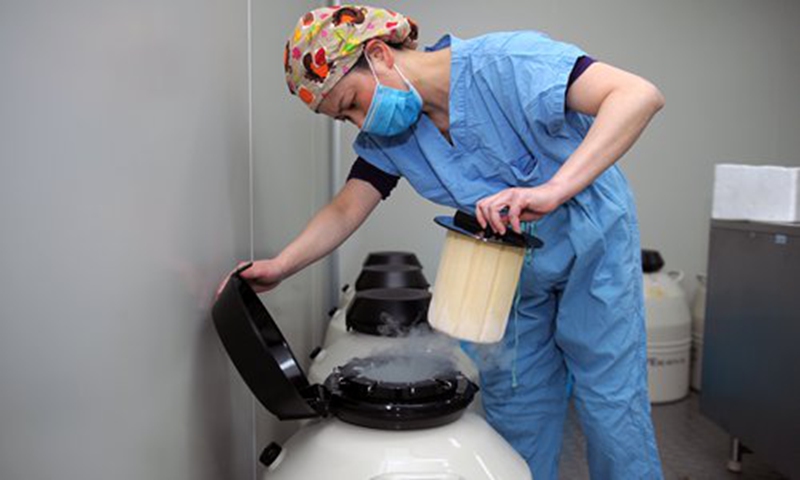
A doctor opens a liquid nitrogen storage container for sperm or eggs at the assisted reproductive medicine center of Sichuan Provincial People's Hospital in the southwestern city of Chengdu. Photo: VCG
Three political advisors in Shanghai proposed setting up a pilot human egg bank to help women conceive, especially cancer patients who might lose their fertility after their rounds of treatment.
Qiu Suo, a lawyer from AllBright Law Offices who also serves as a member of the Shanghai Committee of the Chinese People's Political Consultative Conference (CPPCC), the city's top political advisory body, put forward a proposal during Shanghai's two sessions this year alongside two other political advisors to set up a public egg bank in the Lingang Special Area of the China (Shanghai) Pilot Free Trade Zone.
"This proposal about setting up the egg brank is different from proposals put forward in previous years which were mainly about the legalization of egg freezing," Qiu told the Global Times on Tuesday.
As a professional woman who gave birth at an advanced maternal age, Qiu felt sorry for so many elite women who devote their best years to their careers and lose the opportunity to be mothers.
According to a notification on regulating the assisted reproductive technology (ART) service released by Shanghai's health authority in 2013, egg freezing services can only be provided to couples with a history of infertility and cancer patients who expect to preserve their fertility before undergoing surgery or chemotherapy.
According to Qiu, despite the survival rate of cancer patients significantly increasing, the inevitable radiation and toxicity of radiotherapy and chemotherapy harm women's reproductive functions. Given that cancer has become more common in younger people over the past 10 years, for such women, egg freezing is a valuable option for them to have children themselves.
"I anticipate that breakthroughs can be made one by one in egg freezing for women, and eventually any woman who wants to be a mother in the future can choose to have their eggs frozen in China," Qiu said.
China does not have a specific frozen egg bank set up right now. Instead, female cancer patients can choose to have their eggs stored at hospitals. However, because cancer treatment can take a long time, eggs can be stored at hospitals for between three and five years, meaning that the current situation might lead to a shortage in storage resources and spaces.
Furthermore, if a cancer patient were to pass away, Chinese law does not include any regulations on who inherits the eggs, which might result in disputes between hospitals and patients.
Based on this, the political advisors suggested setting up a public egg bank and carrying out centralized management on frozen eggs to raise efficiency.
Ethical issues concerning egg freezing have been heatedly discussed in recent years, such as egg trading and the recent controversial topic of surrogate mothers.
According to Qiu, the fact that women freeze their own eggs aren't ethical problems as surrogacy and egg trading are prohibited in China. "By strictly controlling the subsequent use of frozen eggs and strengthening the supervision of subsequent in vitro fertilization, embryo cultivation and embryo transfer, the potential ethical problems caused by egg freezing can be effectively prevented," Qiu said.
"In many advanced countries, such as the US and Japan, egg freezing has become a standard medical service. It will be convenient for China to carry out exchanges and cooperation in life science and medical researches with advanced countries by setting up an egg bank in Lingang," Qiu noted.
As a modern metropolis, Shanghai's innovation and breakthrough in its system is bound to gradually affect the whole country, Qiu thought.
"If Shanghai pioneers setting up a public egg bank it will serve as a reference for other regions to follow suit. More people will be aware and accept egg freezing as a medical option to protect women's reproductive rights and further achieve the popularization of egg freezing," Qiu said.




